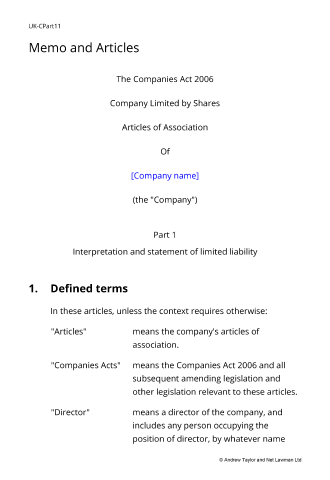Memo and Articles

Document overview

 England & Wales
England & Wales Scotland
Scotland

- Length:29 pages (7650 words)
- Available in:
 Microsoft Word DOCX
Microsoft Word DOCX Apple Pages
Apple Pages RTF
RTF

If the document isn’t right for your circumstances for any reason, just tell us and we’ll refund you in full immediately.

We avoid legal terminology unless necessary. Plain English makes our documents easy to understand, easy to edit and more likely to be accepted.

You don’t need legal knowledge to use our documents. We explain what to edit and how in the guidance notes included at the end of the document.

Email us with questions about editing your document. Use our Lawyer Assist service if you’d like our legal team to check your document will do as you intend.

Our documents comply with the latest relevant law. Our lawyers regularly review how new law affects each document in our library.
Vesting using share classes
Vesting is a concept describing a situation where the rights and rewards that being a shareholder gives are transferred after a certain period of time, or on an event.
There are two ways of achieving this. Either the company grants share options, or the company issues shares that have no rights attached, but which can be converted for shares that do when a condition is met or an event happens.
These articles allow for the second of these two ways. They set out that “B” shares are convertible to “A” shares under certain circumstances defined by you.
For either way, the trigger event could be satisfactory work and involvement for a period of time, or just the passing of time, or the achievement of a particular target.
Granting share options is usually a better way of incentivising individual employees because each grant can be linked to individual performance or circumstances.
Using a second class of convertible shares is usually preferred if the same incentive is being given to a number of people collectively. Most likely, this route will be used if:
founders sell the majority of their “A” shares to an equity investor (to raise capital) on the condition that they will be brought back in as “A” share holders at a later date if the company succeeds as forecast
several new people are brought into the company (most likely as employees, and probably as a result of a buy-out of another business) with the promise to be shareholders in the future if conditions are met
The articles of any company provide the framework for its operation. Any terms between shareholders should be covered in a shareholders’ agreement. We assume that this will be the case here, when you decide on the exact terms for vesting the shares.
In other words, if you want to give the holders of the convertible shares additional rights (such as to attend meetings or be given information), this may be best done in a shareholders agreement, and not the articles. We offer a number of suitable template shareholder agreements.
In most circumstances, we would expect that holders of convertible shares would be given few rights, that the shareholders agreement would be between the owners of the A-class shares only, and that they would revisit any agreement shortly before the B-class shares vest.
Are these articles suitable for your company?
Use this document for a start-up or an existing company in any industry.
Your choices for the operational structure of your company should be about what you will need in the next few years and not necessarily what you minimally need today. You should use this set of articles because the entire document has been prepared with a view to setting appropriate structure, checks and balances for a company intending to use the vesting concept.
We have therefore provided a document that protects every shareholder - not in a way that will “upset the apple cart” but so that each one knows not only what is his or her entitlement but how it is limited.
We include practical and commercial help and suggestions in the guidance notes at the end of the document, as well as the draft minutes of the general meeting of members you will need to hold to change the articles.
Alternative versions
If you are merely exploring the possibility of using vesting shares, you may be interested in our standard set of articles and using option agreements as the mechanism for vesting instead.

Choose the level of support you need
Document Only
This document
Detailed guidance notes explaining how to edit each paragraph
Lawyer Assist
This document
Detailed guidance notes explaining how to edit each paragraph
Unlimited email support - ask our legal team any question related to completing the document
- Review of your edited document by our legal team including:
- reporting on whether your changes comply with the law
- answering your questions about how to word a new clause or achieve an outcome
- checking that your use of defined terms is correct and consistent
- correcting spelling mistakes
- reformatting the document ready to sign
Bespoke
A document drawn just for you to your exact requirements
Personalised service provided by an experienced solicitor
Free discussion before we provide an estimate, for you to ask questions and for us to understand your requirements
Transparent fees - a fixed fee for the basic work, a fixed hourly rate for new or changed instructions, and no charge for office overheads or third party disbursements
Careful and thorough consideration of your circumstances and your consequent likely practical and legal requirements
Provision of options that you may not have considered with availability for discussion
Help and advice woven into the fabric of our service so that you can make the best decisions
All rights reserved
